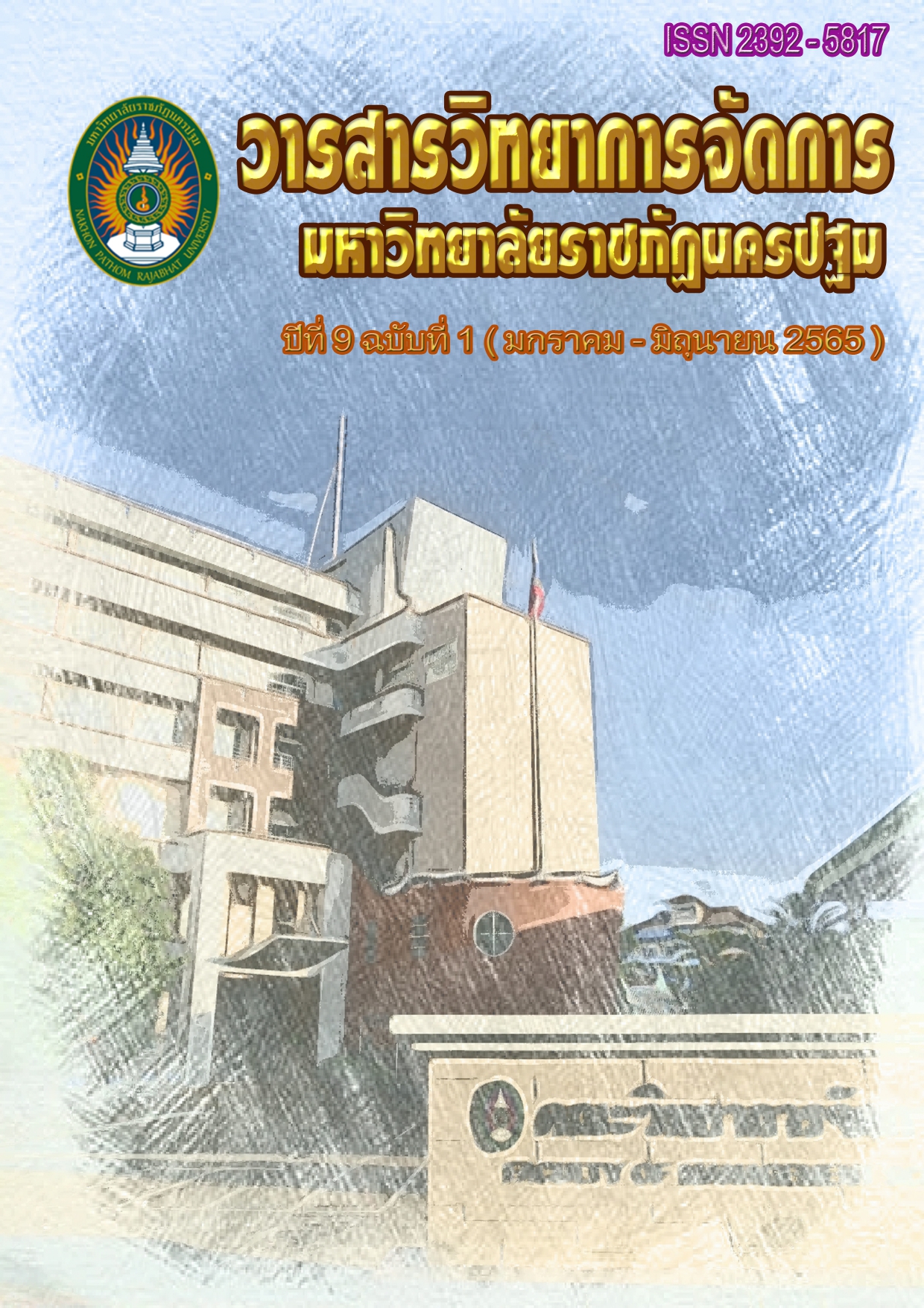Proactive Behavioral Factors and Work Motivation Factors Affecting Career Progression of Personnel in Rangsit University
Main Article Content
Abstract
The objectives of this research article were to study personal factors, proactive behavioral factors, and work motivation factors which influenced career progression of Rangsit University personnel. Data were collected from 344 samples who were selected using quota sampling. The collected data were analyzed by using descriptive statistics to find the frequency, mean, and standard deviation. The reference statistics were employed to analyze the differences between the groups with the t-Test, F-Test, Welch Test and Multiple Regressions Analysis was employed to test the hypothesis relationship.
The results of the hypothesis testing showed that the factors affecting career progression of Rangsit University personnel in overall included 1) personal factors such as status, education level, field of personnel, position, salary, and debt, 2) proactive behavioral factors such as aspects to bring about change, individual innovation, problem prevention, and presenting their voices, and 3) work motivation factors such as building relationships with others and advancement.
Article history : Received 19 April 2021
Revised 5 July 2021
Accepted 8 July 2021
SIMILARITY INDEX = 2.34 %
Article Details

This work is licensed under a Creative Commons Attribution-NonCommercial-NoDerivatives 4.0 International License.
The views and opinions of the article appearing in this journal are those of the author. It is not considered a view and responsibility of the editorial staff.
References
กนกวรรณ สังหรณ์ เพชรสุนีย์ ทั้งเจริญกุล และอภิรดี นันท์ศุภวัฒน์. (2559). การสนับสนุนขององค์กรตามการรับรู้และพฤติกรรมการทำงานเชิงรุกของพยาบาลวิชาชีพ. พยาบาลสาร, 44 (4), 134-144.
จารุวรรณ เมืองเจริญ และประสพชัย พสุนนท์. (2561). ลักษณะส่วนบุคคลและลักษณะของงานที่มีผลต่อความก้าวหน้าในอาชีพของบุคลากรสถาบันอุดมศึกษาเอกชน. วารสารปัญญาภิวัฒน์, 10 (2), 117-127.
ธีรพงศ์ บุญญรัตน์ รุ่งนภา กิตติลาภ และรัชดา ภักดียิ่ง. (2562). ปัจจัยที่มีอิทธิพลต่อแรงจูงใจในการปฏิบัติงานของพนักงานธนาคารออมสิน ในเขตอำเภอเมือง จังหวัดขอนแก่น. วารสารวิชาการและวิจัยมหาวิทยาลัยภาคตะวันออกเฉียงเหนือ, 9 (2), 107-117.
นันธิชา ปัจจัยโย สมใจ บุญหมื่นไวย และ พร้อมพร ภูวดิน. (2562). ปัจจัยที่มีผลต่อความก้าวหน้าในการทำงานของอาจารย์สอนบัญชีในจังหวัดนครราชสีมา. วารสารวิทยาลัยนครราชสีมา, 9 (1), 220 – 226.
บุญธรรม กิจปรีดาบริสุทธิ์. (2553). เทคนิคการสร้างเครื่องมือรวบรวมข้อมูลสำหรับการวิจัย. กรุงเทพฯ: จามจุรี โปรดักท์.
รักชนก แสวงกาญจน์. (2555). ปัจจัยที่มีอิทธิพลต่อความสำเร็จในอาชีพของผู้บริหารโรงเรียนอาชีวศึกษาเอกชน. วารสารการบริหารการศึกษามหาวิทยาลัยบูรพา, 6 (1), 171-185.
วรรณภา ชำนาญเวช. (2551). ปัจจัยสู่ความสำเร็จในการทำงานของพนักงานธนาคารออมสินในเขตกรุงเทพมหานคร และปริมณฑล. วิทยานิพนธ์ปริญญาบริหารธุรกิจมหาบัณฑิต มหาวิทยาลัยศรีนครินทรวิโรฒ.
สุกัญญา แก้วประเสริฐ และลลิตา นิพิฐประศาสน์ สุนทรวิภาต. (2561). ปัจจัยที่มีผลต่อความก้าวหน้าในอาชีพ ของปลัดอำเภอในกลุ่มจังหวัดภาคกลางตอนล่าง. วารสารรัฐศาสตร์ปริทรรศน์ มหาวิทยาลัยเกษตรศาสตร์, 5 (2), 258-270.
สุรพงษ์ มาลี. (2563). แนวโน้ม HR ที่น่าจับตาปี ค.ศ. 2020. วารสารข้าราชการ, 62 (1), 10-13.
สิริวัชร รักธรรม. (2553). ความก้าวหน้าในอาชีพของลูกจ้างในองค์กรพัฒนาเอกชน. สารนิพนธ์ปริญญาพัฒนาแรงงานและสวัสดิการมหาบัณฑิต มหาวิทยาลัยธรรมศาสตร์.
สมเกียรติ รุ่งเรืองวิริยะ. (2557). วิชาตกเขา. ปทุมธานี: อาร์เอสยู พับลิชชิ่ง.
Alderfer, C. P. (1976). ERG Theory of Motivation Clayton Alderfer's revision of Abraham Maslow. New York: Harper and Row.
Fiske, P. S. (2012). Putting Your Science to Work: Practical Career Strategies for Scientists. Retrieved November 30, 2020, from https://www.aps.org/careers/guidance/webinars/upload/Fiske-Booklet.pdf
Moore, R. (2018). Employee Debt Linked to Lower Work Productivity. Retrieved November 30, 2020, from https://www.plansponsor.com/employee-debt-linked-lower- work-productivity/
Noe, R. A. (2011). Fundamentals of Human Resource Management. United States: McGraw Hill Higher Education.
Parker, S. K., & Collins, C. G. (2010, July). Integrating and Differentiating Multiple Proactive Behaviors. Journal of Management, 36 (3), 633 - 662.
Schwab, K. (2017). The Fourth Industrial Revolution. United Kingdom: Penguin Books Limited.


